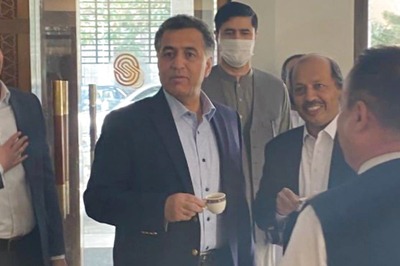
views
New Delhi: What was supposed to be a triangular battle in Delhi has been turned into a clean sweep for the Bharatiya Janata Party (BJP), with the Aam Aadmi Party (AAP) ending up at the number three position. At the time of publishing this report, the Election Commission data showed that except for South Delhi and North West Delhi, it is the Congress that is trailing at number two position.
This time, AAP leader and Delhi chief minister Arvind Kejriwal was convinced that if his party and the Congress could form an alliance, they would be able to overcome the Narendra Modi factor and defeat the BJP. His arithmetic was simple: the two parties had polled nearly 48 per cent votes as against BJP’s 46 per cent in the 2014 Lok Sabha elections. But the result looks like he would have been proven wrong anyway.
According to the latest EC data, the AAP has got an estimated vote share of 18.5 per cent and the Congress has got about 22 per cent. However, the saffron party has alone acquired a vote share of about 56 per cent — 7.5 per cent more than that of AAP and Congress together.
It should be noted that the numbers are according to the latest updates from the EC website and are liable to change.
In the 2014 elections, while the BJP had a vote share of 46 per cent, AAP and Congress had vote shares of 33 per cent and 15 per cent, respectively. Reports from the ground suggested that voters wanted to see PM Modi leading the Centre and Kejriwal the Delhi government. However, the current trend of vote share clearly indicates that the popularity of AAP has diminished and the main beneficiary is the BJP, while as the Congress taking the second place in most seats could be sigh of relief for the grand old party.
Interestingly, after the polls got over, Kejriwal made a candid confession when he said the Muslim voters shifted at the last moment. This sent out a message that the Congress, which came third behind AAP, in all the seven seats in 2014, could pose a serious challenge to BJP in at least some of the seats this time.
Among all the candidates from AAP and the Congress, the toughest fight any candidate has been able to put up is Jai Prakash Agarwal from Congress. Prakash was trailing with a margin of around 89,000 votes in the Chandni Chowk constituency. In all other constituencies, the margin varied between 1-2 lakh votes.
In the 2015 assembly polls, the AAP got a vote margin of 54.5 per cent, while BJP got 32.3 per cent. The Congress could not even touch the 10 per cent mark. In 2013 assembly polls, AAP was at 29.7 per cent, BJP at 33.3 per cent and Congress was at 24.7 per cent. The transition of vote share from 2013 to 2015 and then to 2019 suggests that the voters in Delhi are fast changing their choice and inclining back towards the national parties. With Delhi Assembly elections about a year away, the trend must worry the ruling party in the city, which won 67 of the 70 assembly seats.
The Congress stalwarts of Delhi, who have ruled and been ministers in the capital’s government for over a decade, like Sheila Dikshit, Ajay Maken and Arvinder Singh Lovely, are also staring at big margin defeats.
The AAP was fighting this election on the ground of seeking statehood for the capital. For over a month, the two parties — AAP and Congress — kept the mystery on forming alliance for the Delhi elections. Through interviews, Congress president Rahul Gandhi clarified that while his Delhi team did not prefer to form the alliance, it was him who chose to give it a thought.
However, as the two parties could not come on a consensus over the seat-sharing formula, the talks were finally called off just a week or so before the polling day. This seem to have reportedly damaged the AAP voter-base as at its inception, party founder Kejriwal was of the view of opposing both the national parties.

















Comments
0 comment